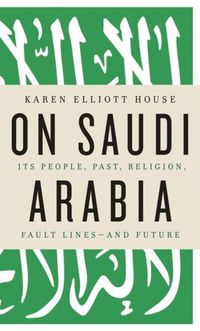

Purchase
ts People, Past, Religion, Fault Lines - and Future
Knopf
September 2012
On Sale: September 18, 2012
320 pages
ISBN: 0307272168
EAN: 9780307272164
Kindle: B007MDK5GM
Hardcover / e-Book
Add to Wish List
Non-Fiction
From the Pulitzer Prize–winning reporter who has spent the
last thirty years writing about Saudi Arabia—as diplomatic
correspondent, foreign editor, and then publisher of
The Wall Street Journal—an important and
timely book that explores all facets of life in this
shrouded Kingdom: its tribal past, its complicated present,
its precarious future.
Through observation,
anecdote, extensive interviews, and analysis Karen Elliot
House navigates the maze in which Saudi citizens find
themselves trapped and reveals the mysterious nation that is
the world’s largest exporter of oil, critical to global
stability, and a source of Islamic terrorists.
In
her probing and sharp-eyed portrait, we see Saudi Arabia,
one of the last absolute monarchies in the world, considered
to be the final bulwark against revolution in the region, as
threatened by multiple fissures and forces, its levers of
power controlled by a handful of elderly Al Saud princes
with an average age of 77 years and an extended family of
some 7,000 princes. Yet at least 60 percent of the
increasingly restive population they rule is under the age
of 20.
The author writes that oil-rich Saudi Arabia
has become a rundown welfare state. The public pays no
taxes; gets free education and health care; and receives
subsidized water, electricity, and energy (a gallon of
gasoline is cheaper in the Kingdom than a bottle of water),
with its petrodollars buying less and less loyalty. House
makes clear that the royal family also uses Islam’s
requirement of obedience to Allah—and by extension to
earthly rulers—to perpetuate Al Saud rule.
Behind
the Saudi facade of order and obedience, today’s Saudi
youth, frustrated by social conformity, are reaching out to
one another and to a wider world beyond their cloistered
country. Some 50 percent of Saudi youth is on the Internet;
5.1 million Saudis are on Facebook.
To write this
book, the author interviewed most of the key members of the
very private royal family. She writes about King Abdullah’s
modest efforts to relax some of the kingdom’s most
oppressive social restrictions; women are now allowed to
acquire photo ID cards, finally giving them an identity
independent from their male guardians, and are newly able to
register their own businesses but are still forbidden to
drive and are barred from most jobs.
With
extraordinary access to Saudis—from key religious leaders
and dissident imams to women at university and impoverished
widows, from government officials and political dissidents
to young successful Saudis and those who chose the path of
terrorism—House argues that most Saudis do not want
democracy but seek change nevertheless; they want a
government that provides basic services without subjecting
citizens to the indignity of begging princes for handouts; a
government less corrupt and more transparent in how it
spends hundreds of billions of annual oil revenue; a kingdom
ruled by law, not royal whim.
In House’s assessment
of Saudi Arabia’s future, she compares the country today to
the Soviet Union before Mikhail Gorbachev arrived with
reform policies that proved too little too late after
decades of stagnation under one aged and infirm Soviet
leader after another. She discusses what the next generation
of royal princes might bring and the choices the kingdom
faces: continued economic and social stultification with
growing risk of instability, or an opening of society to
individual initiative and enterprise with the risk that
this, too, undermines the Al Saud hold on power.
A
riveting book—informed, authoritative, illuminating—about a
country that could well be on the brink, and an in-depth
examination of what all this portends for Saudi Arabia’s
future, and for our own.
Comments
No comments posted.
Registered users may leave comments.
Log in or register now!
| 


 © 2003-2024 off-the-edge.net
all rights reserved Privacy Policy
© 2003-2024 off-the-edge.net
all rights reserved Privacy Policy